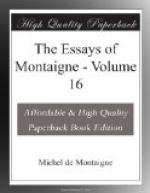But if my heart be not great enough, ’tis open enough to make amends, at any one’s request, freely to lay open its weakness. Should any one put me upon comparing the life of L. Thorius Balbus, a brave man, handsome, learned, healthful, understanding, and abounding in all sorts of conveniences and pleasures, leading a quiet life, and all his own, his mind well prepared against death, superstition, pain, and other incumbrances of human necessity, dying, at last, in battle, with his sword in his hand, for the defence of his country, on the one part; and on the other part, the life of M. Regulus, so great and high as is known to every one, and his end admirable; the one without name and without dignity, the other exemplary and glorious to a wonder. I should doubtless say, as Cicero did, could I speak as well as he.
[Cicero, De Finibus,
ii. 20, gives the preference to Regulus, and
proclaims him the happier
man.]
But if I was to compare them with my own, I should then also say that the first is as much according to my capacity, and from desire, which I conform to my capacity, as the second is far beyond it; that I could not approach the last but with veneration, the other I could readily attain by use.
Let us return to our temporal greatness, from which we are digressed. I disrelish all dominion, whether active or passive. Otanes, one of the seven who had right to pretend to the kingdom of Persia, did as I should willingly have done, which was, that he gave up to his competitors his right of being promoted to it, either by election or by lot, provided that he and his might live in the empire out of all authority and subjection, those of the ancient laws excepted, and might enjoy all liberty that was not prejudicial to these, being as impatient of commanding as of being commanded.
The most painful and difficult employment in the world, in my opinion, is worthily to discharge the office of a king. I excuse more of their mistakes than men commonly do, in consideration of the intolerable weight of their function, which astounds me. ’Tis hard to keep measure in so immeasurable a power; yet so it is that it is, even to those who are not of the best nature, a singular incitement to virtue to be seated in a place where you cannot do the least good that shall not be put upon record, and where the least benefit redounds to so many men, and where your talent of administration, like that of preachers, principally addresses itself to the people, no very exact judge, easy to deceive, and easily content. There are few things wherein we can give a sincere judgment, by reason that there are few wherein we have not, in some sort, a private interest. Superiority and inferiority, dominion and subjection are bound to a natural envy and contest, and must of necessity perpetually intrench upon one another. I believe neither the one nor the other touching the rights of the other party; let reason therefore, which is inflexible and without passion, determine when we can avail ourselves of it. ’Tis not above a month ago that I read over, two Scottish authors contending upon this subject, of whom he who stands for the people makes the king to be in a worse condition than a carter; he who writes for monarchy places him some degrees above God in power and sovereignty.




